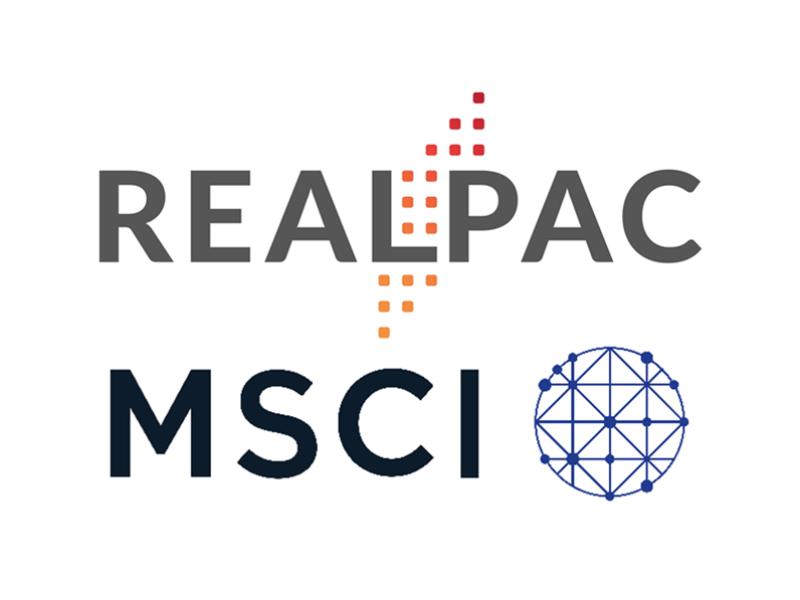
Panelists including CEOs and analysts discuss smaller CAP REITs during the virtual RealREIT conference. Clockwise from top left: moderator Andrew Wallace of National Bank; Steve Hodgson of Slate Office REIT; Michael Zakuta of Plaza Retail REIT; Jenny Ma of BMO Capital Markets; Michel Léonard of BTB REIT; and Milton Lamb of Automotive Properties REIT. (Screenshot via Steve McLean, RENX)
Access to capital and liquidity are key considerations for REITs of all sizes, but perhaps moreso for smaller trusts. The issue was one of several discussed by a panel of smaller cap REIT CEOs and analysts during RealREIT in September.
“There’s a broad assumption in the capital markets that bigger is better and that liquidity drives valuations and, eventually, returns for investors,” said panel moderator and National Bank Financial head of real estate investment banking Andrew Wallace.
EDITOR’S NOTE: This is Part II of our article on the conditions and issues facing smaller cap REITS. Part I was published on Monday.
BMO Capital Markets equity research director Jenny Ma said it’s not feasible for some large institutional investors to invest in small cap REITs because of liquidity and size concerns.
Automotive Properties REIT (APR-UN-T) did a capital raise priced at $11.65 per unit in December 2019 to support continued momentum, but when the pandemic struck instead used it as a COVID-19 “security blanket,” according to president and CEO Milton Lamb.
The stock has recently been trading at around $10, so Lamb said it’s not a good time to hit the market to raise capital even if it’s available, because it doesn’t protect current shareholder value.
Lamb said many REITs have leverage of 50 per cent or lower, which eases concerns from bankers and investors and provides trusts with much more flexibility.
Slate Office REIT (SOT-UN-T) had a record-breaking year for raising capital in 2019 and hasn’t had to raise any this year.
“Our lenders have been very appreciative of us not calling them and asking for help,” said CEO Steve Hodgson. “We’ve had a couple of mortgage refinancings that we’ve been working on this year, as well as a revolving credit facility maturing in early 2021.
“We’ve found that the banks and other lenders have been very cooperative.”
In addition to good relationships with its syndicated banks, Hodgson said Slate has the added benefit of Slate Asset Management sponsorship. The REIT has a right of first opportunity on any office deal Slate Asset Management makes in Canada or the United States.
“At a time when it was difficult for us to be competitive on single-asset transactions, because suburban Toronto was and still is a very popular investment opportunity, we were able to access wholesale pricing through Slate Asset Management doing a portfolio acquisition,” said Hodgson.
Importance of asset class for smaller cap REITs
Storage facility REITs have been a big winner over the past five years, with industrial and multifamily trusts also generally performing very well.
Ma said lower payouts and distributions by industrial and multifamily REITs allow them to conserve more capital to put into growth.
“Asset class matters, but underpinning those asset classes really is intrinsic organic growth,” said Ma. “That’s what investors are really drawn toward.”
Institutional investors are particularly interested in “focus and sharpshooting,” Ma added, either by asset class or geography.
“You can be in an out-of-favour asset class and be performing very, very well, but you will not get credit for your performance,” said Plaza Retail REIT (PLZ-UN-T) president and CEO Michael Zakuta. “You can be in a favoured asset class and you can be performing poorly and you’re not going to pay the price for your poor performance.
“But eventually I think the market does adjust and I think the strong performers get rewarded and the poor performers do pay the price. We’re in that period now where asset class is obviously very important.”
While diversified REITs have generally lagged in performance behind those that are more focused, president and CEO Michel Léonard believes BTB REIT’s (BTB-UN-T) diversity has been a benefit.
“In bad times, sometimes your asset classes are doing less well than others. But those that are doing very well are contributing to the bottom line and making sure that you’re sustainable.”
Slate is trading at a 60 per cent discount to NAV despite strong operating results and liquidity and no major problems to contend with, as Hodgson said investors are taking a longer term view of the office sector.
“We’re not going to see how office demand and office life is going to shake out for at least another six to 12 months at this rate,” said Ma, who is still working from home and hasn’t returned to her office. “Tenants and office users aren’t going to make rash decisions and they’re not going to give all of their space back, but they’re not going to be running out to try and grab as much space as they can (because there isn’t a need at this point).”
Ma tells clients if they think they missed out on investing in certain REITs before the pandemic, they have a chance now to reconsider at lower prices.
Advantages of being a smaller cap REIT
Agility, being able to take advantage of opportunities quickly, and being present within its business environment are advantages of being smaller, according to Léonard.
One action by a smaller cap REIT can have a much bigger impact on net operating income than it might have on a larger REIT, Léonard added.
“If you’re a smaller cap, you have the ability to grow while still being very targeted in what you grow with,” said Lamb. “That’s both on acquisitions and in value-add within your portfolio to kind of move the needle.”
Growth opportunities
“We expect a lot of opportunities to be coming out of COVID,” said Hodgson. “We had a capital recycling program last year where we were recycling capital from Canada to the U.S. We’ve been active in Chicago and we’re looking at underwriting elsewhere in the U.S. I think it’s a bit of a leading indicator for what’s going to happen in Canada because there’s more deal volume there.
“There’s a pretty significant bid-ask spread at the moment. It’s a little early and it’s tough on the buy side to price risk and to see where rents are going to go. I think there needs to be a bit more certainty in the market before we act, but we have liquidity and we’re very interested in the opportunities to come — and there are going to be a lot of them.”
“We foresee more opportunities post-COVID versus pre-COVID,” Zakuta said. “Retail, as we all know, is very challenging.
“As we put COVID behind us, there are going to be opportunities for us to make what I call near-development returns without taking substantial development risk, which is a little exceptional for us. I think it’s still early on and I don’t think you’re going to start seeing interesting deals until the new year.”
Zakuta believes opportunities will come from large owners who want to reduce retail holdings or exit from the asset class altogether, as well as from passive retail property owners struggling to fill vacancies and are poorly equipped to lease retail space.
“I think we’re going to see a lot less competition and therefore a lot more opportunities. The pie may be smaller, but we get a bigger piece of the pie. So, as a small cap REIT, we’re nimble enough to adjust to market conditions and I think take advantage of these opportunities.”











